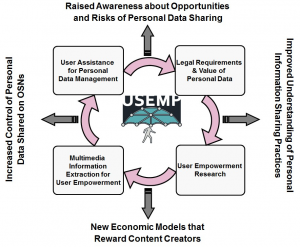The USEMP platform aims at providing tools that enable OSN users to control their data and to understand how they are used by third parties. An approach is proposed that starts with the study of personal information sharing practices, coupled with a study of the complex legal framework related to this information. It proceeds with the proposal of innovative multimedia information extraction algorithms that infer new knowledge from user data and leverages insights from social and computer science developments to empower the users. As a second goal, USEMP is set to contribute to current debates concerning the way personal data are handled by OSNs and regarding the economic value of personal information and the way it is monetised. To attain its goals, USEMP proposes a multidisciplinary approach that relies on four core domains: (a) empirical user research that combines lab and living lab studies, (b) legal studies that deal with the complex legal framework related to personal data, (c) multimedia information extraction adapted to user empowerment in OSNs and (d) tools for semiautomatic user assistance in personal data sharing management. The four main research pillars of interact with each other in the form of a virtuous circle as illustrated in the following Figure.
As a starting point, an in-depth analysis of the existing and upcoming legal framework related to personal data will be provided. The insights obtained from this study will result in a coherent implementation of EU law, which will guide all other parts of the project. A comprehensive array of user research focalised on personal information, including: qualitative and quantitative data sharing behaviours; usage of privacy feedback and awareness tools, user’s attitude with regard to monetisation of personal content by OSNs, insights concerning seamless interaction with personal data. Given that personal data will be processed in USEMP, data collection will be done with strict compliance to existing law and the appropriate mechanisms will be implemented in order for the users to be informed of the way data are collected and processed and to provide them with control over information sharing and extraction processes. Insights from legal studies and user research will guide the proposal of multimedia information extraction techniques adapted to personal information shared on OSNs. Emphasis will be put on integrating user feedback in the USEMP tools and on explainability of the extraction processes in order to facilitate the adoption of the tools by the users. Volunteered and observed information will be processed in order to infer new information from texts, images, likes, browsed sites, etc. Legal studies, user research and information extraction algorithms will be exploited in order to propose tools that raise the user’s awareness concerning her privacy on OSNs and of the economic value of her information and that assist her in managing personal content. Then, a human-computer interaction paradigm adapted to personal information management will be devised and implemented in easy-to-use interfaces. The scientific developments will be integrated in a prototype that will be tested through large scale living lab studies.
From a scientific and technical perspective, the goal of USEMP is to propose a multidisciplinary approach that will empower users in their interactions with OSNs. User awareness concerning the opportunities and risks of sharing personal information will be raised. The developed tools will assist users to easily remove/change the visibility of personal information, to acknowledge the economic value of their information and, in some cases, to license such content to third parties. More specifically, the USEMP project is motivated by the following objectives:
S1. Analyse the existing and proposed legal framework of privacy and data protection with regard to OSNs and assess the value of shared personal information in order to provide useful insights for developing semi-automatic tools that assist users in handling their personal information.
S2. Advance the understanding of personal data handling through an in-depth analysis of privacy feedback & awareness tools and through qualitative and quantitative analysis of data sharing behaviour, including automatic data pre-processing that will allow scaling up the analysis.
S3. Create multimedia information extraction methods adapted to personal information management, with focus on user feedback and explainability in order to ensure fast adoption by the users.
S4. Improve the management of personal information by proposing tools that raise the users’ awareness regarding the opportunities and risks of sharing data and assist the users in their interaction with these data.
S5. Contribute to the current debates related to the way personal data should be monetised and propose economic models that are more respectful toward content creators (i.e. OSN users).
S6. Propose an innovative living labs approach, adapted for personal data handling in OSNs.

